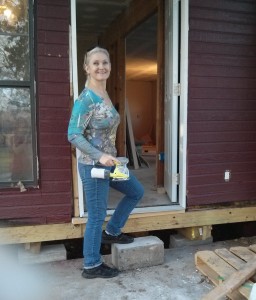
Maria Schneider, Terra Shelter, Inc.
Maria Schneider is out to change the construction industry in Dallas, Texas, one ex-offender at time. Her way to do this: By building a nonprofit that sells rehabbed homes to veterans at below market rate prices and hires employees who were formerly incarcerated.
Her original plan was to rehab houses, but how she decided to hire formerly incarcerated workers came about in a rather serendipitous way.
Trained as an electrical engineer and a biomedical engineer, Schneider got started in construction in her late 20s. The only house she could afford to buy needed a lot of work, and she did it in her spare time. She loved the process and later launched a construction company.
“I had a residential custom building business in the mid 2000s. It was in Austin, and there was an economic boom there,” she says. “The only people I could find to work were ex-offenders, and I got to know them really well and started understanding some of the issues involved in reentry.”
These issues ranged from a lack of a place to live and bad relationships with family members to substance abuse and access to reliable transportation. Another issue was not having a way to make money, which Schneider solved by hiring them.
It wasn’t easy though. “You really have to start from scratch and teach them a lot of things besides the job. You have to teach them a lot of life skills and tell them what to do,” she says.
“But ex-offenders are excluded by a lot of places automatically, so if someone doesn’t include them they’re not going to end up with jobs. A lot of programs provide job training but not jobs. You have to provide them not just with the job training but a job that goes along with it, so they’ll have some income while they’re developing skills and be able to show some experience on their resume.”
After starting to build homes again and forming a nonprofit, Terra Shelter, Inc., Schneider remembered those workers she had once hired and wanted to create jobs for others like them. And she has. In fact, she has made it her mission to do so.
Although Schneider is just, as she says, starting out, her organization has already rehabbed five homes built in the 1920s and 1930s – most of which had to be completely gutted – and located in some of the worst neighborhoods in the city of Dallas.
She’s teamed up with the Tarrant County Housing Partnership. The organization works with several banks, which are required by the government to donate some of the foreclosed homes they receive to nonprofits as part of an anti-blight effort.
The organization began about a year and a half ago, when it received donated houses that were in pretty bad shape. “While our focus was on providing affordable housing, in the process I decided that what I really wanted to do was to work with ex-offenders and teach them the skills they needed to do the job,” she says.
Although working with employees who have been incarcerated has more than its share of challenges, Schneider has found many of them to be very loyal and hard working.
Up until now, she has hired people rather randomly. In the rough and tumble neighborhood of southeast Dallas where her nonprofit works rehabbing houses, she’s often approached by ex-offenders looking for work.
After dealing with the unreliability of some of the workers she hired this way, Schneider decided this recruitment method was unsustainable and has partnered with the Oasis Center, a nonprofit organization providing reentry services and mentoring that help formerly incarcerated individuals get a new start.
In the meantime, her site supervisor is an ex-offender, and Schneider tries to hire as many formerly incarcerated individuals as possible. If she can’t, however, she turns to veterans. Her plumber and electricians fall into this category.
The houses she’s rehabbed have been a really good learning experience, but as a sustainability consultant, Schneider is passionate about green building and would like to get into new home construction. “Trying to build green and affordable is kind of radical here in Texas,” she says.
But no doubt so is hiring ex-offenders. And both are challenges she’s determined to take on.



Dear Maria;
I am in awe of what you have accomplished in your life and what you are doing now to give back! It is amazing and thank you. I have a husband who is a vietnam vet and a son that is incarcerated until 2020. It has been very difficult and I wonder what he will do when he gets out. He also had his own remodling business. I pray he will be able to re-establish himself once out as building is his passion. I also received some wonderful information from your site, that the banks are required to donate a certain amount of the foreclosures. that is very interesting to me, as I had a house for women a few years ago. My passion is working with women in recovery from alcohol and substance abuse. and I want to open another house someday and one for women and children.
Thanks for your story and your expertise!
In His Service,
Shari